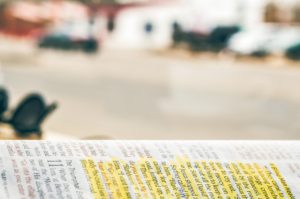Ever notice how sin – or even simple flaws – often look different on different people? Or, have you ever found yourself disgusted by behavior in one person (or yourself), but give a pass to a close friend or loved one who does the exact same behavior? It’s how we normalize sin. For example…
Perhaps you don’t care too much for Jane in accounting who goes around telling everybody’s business… but your favorite Aunt Linda, well, “that’s just the way she is.”
You’re understandably firm about your friend’s significant other who is being unfaithful… but your big brother James, well, “he’s always had all the women.”
The Hypocrisy of Normalizing Sin
Team, we have a problem. I say “we” because we clearly won’t point the finger at the playbook.
When the Bible speaks of behaviors, attitudes, thoughts that are sinful – things we must intentionally avoid – there are no hidden asterisks representing a special group of people in our lives who are exempt.
None of us have the respect of God (Romans 2:11), where we can skip over the pursuit of sanctification through Jesus Christ (Hebrews 12:14, Philippians 2:12). The guidance that has been given to one has been given to all who take up their cross to follow Jesus.
So, why do we often engage in the normalization of sin?
Our Normal vs. God’s Standards
 Whenever there’s a disconnect between a) what we promote, affirm, or approve as right and wrong and b) the standards of God – we have somehow overstepped a boundary and attempted to take something that belongs to God.
Whenever there’s a disconnect between a) what we promote, affirm, or approve as right and wrong and b) the standards of God – we have somehow overstepped a boundary and attempted to take something that belongs to God.
Now, that may sound crazy or dramatic, but think of it this way: What does it take for us to give ourselves and/or others a pass with regards to God’s standards?
Oftentimes when we normalize sin, we unwittingly attempt to sit on God’s throne (Psalm 47:8) as if we are the all-knowing authority and Creator of the world. Did God give us permission to infringe upon His intellectual property and re-write His words, giving them a different meaning and consequence?
We are to say what God says, regardless of our loving and favorable bias towards the intended party.
What does sin bias look like?
Our bias enables us to normalize sin. Here are 4 types of sin bias that we all must search our hearts for and immediately evict:
1. Everybody’s doing it (numbers).
“If so many people are doing it, God must not really care. He won’t let that many people go to hell.” Be not deceived, teammates! We’ve already been warned that broad is the way that leads to destruction (Matthew 7:13). Broad implies “many people”. We see it in society everywhere – people finding perceived safety and solace in the multitude of voices who say wrong is right and right is wrong – from the LGBTQ community, gay marriage, to sexual “test drives” before marriage.
2. They’re just old/young (age).
“Because they’re so {old, young}, God will excuse their behavior.” Newsflash, Team. There are no age-related exemptions to the principles and ordinances of God. I kid you not – I actually heard a pastor say from the pulpit on a packed Sunday morning:
“Sure, we preach against fornication, but what are you gonna tell Grandma who wants to get her groove on?”
Lord. Teammates, you had sure better tell Grandma, mom, dad, and anyone else you love what thus saith the Lord, and not look to their age, nor have…
3. Blinding admiration.
We all have people we admire and treasure in our lives – from family, best friends, and mentors. However, the lens through which we view them is not the same lens that God uses; God’s lens can see straight to the heart!
Think not that God will dishonor His own principles to acquiesce to our view of a person. We must keep things in the proper perspective – even when dealing with people to whom we are fiercely loyal.
4. But I do it, too.
Uh oh. It’s hard for some to call a “spade a spade” when we’re wearing the spade. And, oddly enough, sometimes we cry loud and spare not when we see our spades in other people’s lives. Nevertheless, this hypocrisy is out of order and gives us zero cover from God seeing all. We can’t quell the conviction of the Holy Spirit that we feel by turning a blind eye. Instead, let’s submit and align to where God is leading us so that others may follow us as we follow Christ (1 Corinthians 11:1).
So, What’s the Play Call?
Let God be true, and every man be a liar (Romans 3:4). What does that mean? If it comes down between God’s principles and standards and our will, thoughts, perceptions, beliefs, or convictions – go with God!
Don’t let your loyalty, friendship, bloodline, or admiration be a stumbling block in another person’s life. How many today refuse to seek God or to repent and receive God’s grace because everyone has told them, “You’re fine. Live your truth. It’s ok. Be your authentic self.” – no matter how much their authentic self opposes God?
Yes, this article talks about sin and how we can unknowingly or knowingly normalize sin. But, we can’t end it without some good news: Sin is no match for God’s grace – the grace of God will always abound over sin (Romans 5:20).




